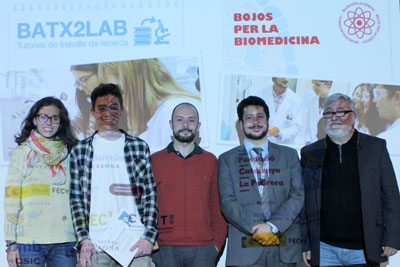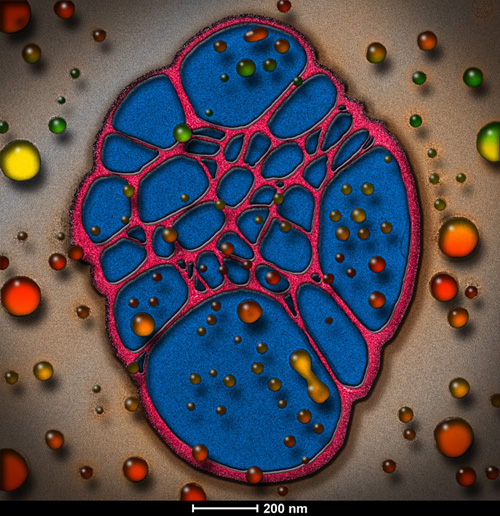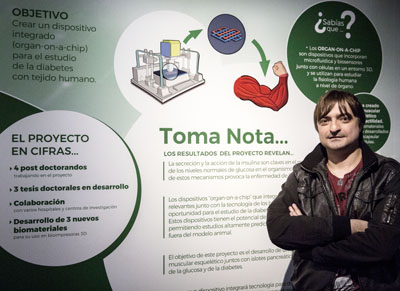II Festival de la Nanociencia (10alamenos9)
Various venues; various dates
Various venues; various dates
 Uno de los estudiantes tutorizados en el IBEC bajo el programa BATX2LAB fue galardonado el pasado miércoles en la ceremonia anual de la iniciativa para premiar los mejores proyectos de investigación.
Uno de los estudiantes tutorizados en el IBEC bajo el programa BATX2LAB fue galardonado el pasado miércoles en la ceremonia anual de la iniciativa para premiar los mejores proyectos de investigación.En BATX2LAB, organizado por el PCB y CatalunyaCaixa, los investigadores que trabajan en el parque científico son asignados como tutores a los alumnos de bachillerato que están iniciando sus proyectos de investigación. Este programa permite a los estudiantes participantes llevar a cabo su investigación en un laboratorio y con el apoyo de un científico experimentado.
Imaging therapy response and failure
Imaging therapy response and failure
Imaging therapy response and failure
Imaging therapy response and failure
 Una imagen de la unidad de Nanomalaria de Xavier Fernández-Busquets ha sido seleccionada como imagen del mes de abril de 2017 para la Pinacoteca de la Ciencia, un concurso organizado por la Sociedad Española de Bioquímica y Biología Molecular (SEBBM).
Una imagen de la unidad de Nanomalaria de Xavier Fernández-Busquets ha sido seleccionada como imagen del mes de abril de 2017 para la Pinacoteca de la Ciencia, un concurso organizado por la Sociedad Española de Bioquímica y Biología Molecular (SEBBM).La imagen de microscopía electrónica de crio-transmisión de unos liposomas preparados para la encapsulación de fármacos dirigidos a los glóbulos rojos infectados por el parásito de la malaria Plasmodium falciparum fue el resultado de la colaboración continua de Xavier con el artista Marc Cirera.
La Pinacoteca de la Ciencia del SEBBM, patrocinada por Eppendorf, muestra las mejores fotos enviadas por los socios de la sociedad mes a mes.
 Este fin de semana el proyecto del Dr. Javier Ramón, DAMOC, financiado por el Consejo Europeo de Investigación (ERC) , fue uno de los ocho destacados en una exposición especial en Madrid para conmemorar el décimo aniversario del ERC.
Este fin de semana el proyecto del Dr. Javier Ramón, DAMOC, financiado por el Consejo Europeo de Investigación (ERC) , fue uno de los ocho destacados en una exposición especial en Madrid para conmemorar el décimo aniversario del ERC.El Museo Nacional de Ciencia y Tecnología (MUNCYT) de Alcobendas ha presentado los proyectos más destacados dirigidos por investigadores en España como parte de un fin de semana completo de actividades para celebrar la primera década del prestigioso organismo de financiación lanzado en 2007 por la Unión Europea, que ha financiado a cerca de 7.000 investigadores, entre ellos seis premios Nobel.

Application Deadline: 30/04/2017
Ref: PD-JR
The Biosensors for bioengineering group at the Institute for Bioengineering of Catalonia (IBEC) is looking for a Postdoctoral Researcher in order to work in the project Diabetes Approach by Multi-Organ-on-a-Chip (DAMOC).This position will be funded by the “ERC Starting Grant” from the European Research Council (ERC).
Training activity in Risk Prevention